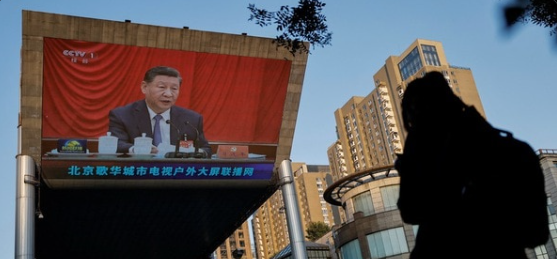China steals well over 500 billion dollars’ worth of Intellectual property from the United States yearly. We have been their base of technology for decades as they swarm our institutes of higher learning and top companies, then steal everything we have. It has made them a world power and technological powerhouse. Now, understanding that Intellectual property is important, they look to stop others from seeing all that they have stolen.
China has introduced new regulations to strengthen the protection of sensitive information, particularly state secrets, with an expanded scope under the revised Law on Guarding State Secrets. These regulations, announced on Monday, aim to enhance the security measures across government sectors and address potential vulnerabilities in data protection. The move reflects Beijing’s concerns about foreign entities accessing information ranging from political and economic data to environmental statistics.
China takes strict measures to protect state secrets
A total of 74 articles in the new regulations refer to more than 10 provisions under the amended law, which took effect in Mayhttps://t.co/mZFNCOIo2h— Shadi Alkasim (@Shadi_Alkasim) July 23, 2024
The updated rules comprise 74 articles that elaborate on over a dozen new provisions in the state secrets law, which was significantly revised for the first time in a decade and took effect in May. Under the new regulations, heads of government departments who have the authority to determine state secrets will be tasked with defining and listing these secrets. These officials will undergo specialized training to identify and protect sensitive information.
Moreover, every central Communist Party organ and government agency is required to establish a dedicated office for state secrets security. These offices will be staffed with officials solely responsible for overseeing the protection of confidential information. The regulations also mandate that government departments identify specific positions that handle state secrets and conduct thorough screenings of officials before they begin their roles. Ongoing confidentiality training is also required for these positions.
Under the new rules, employees handling state secrets are prohibited from traveling abroad without prior permission. This restriction applies even after they leave their positions and may be permanent in some cases. The handling of top-level state secrets is strictly regulated; specialized personnel must manage the receipt and dispatch of such information, and at least two individuals must be present when handling these materials. Additionally, these items can only be accessed in designated locations and are not permitted to be copied or downloaded.
China rolls out strict new measures for government sector to protect state secrets – SCMPhttps://t.co/e1IHAhOduO
How does the CCP leadership approach its internal security policies? @SheenaGreitens discusses China’s national security strategies and more: https://t.co/uhaVAJrE1c
— ChinaPower (@ChinaPowerCSIS) July 23, 2024
The regulations, set to take effect in September, also call on manufacturers to innovate security and secrecy products, employing new technologies and methods. Individuals and organizations making significant contributions to these areas will be rewarded. Companies involved in producing state secret-related products must meet specific qualifications, and personnel in these roles must be Chinese nationals.
State news agency Xinhua highlighted the evolving nature of state secrets, noting that they are increasingly digital and internet-based, which introduces new risks of leaks and theft. The updated law grants the National Administration of State Secrets Protection, under the State Council, broader authority to investigate state secrets cases in various sectors, including education, technology, and the military.
#FPWorld: China has strengthened measures to protect state secrets as it tightens screw on government sector firms amid growing digital threatshttps://t.co/SxNlLygmxU
— Firstpost (@firstpost) July 24, 2024
Earlier this year, Li Zhaozong, head of the administration, emphasized in an article that China needs a more scientific and comprehensive national secrets management system to ensure information security aligns with national security. President Xi Jinping has also underscored the need for vigilance, citing “more complex” security challenges and urging officials to prepare for “worst-case and most extreme scenarios.”
Major Points:
- China has introduced new regulations under the revised Law on Guarding State Secrets to enhance the protection of sensitive information, expanding the scope and detail of the law.
- Government department heads are tasked with defining state secrets, creating lists, and receiving specialized training to safeguard this information.
- Dedicated offices for state secrets security will be established across all central Communist Party organs and government bodies, with specific positions identified and screened for handling confidential information.
- Employees dealing with state secrets are restricted from international travel without prior approval, with some restrictions potentially being permanent even after leaving their positions.
- The regulations also call for innovation in security technologies and specify that personnel working on state secret-related products must be Chinese nationals.
Al Santana – Reprinted with permission of Whatfinger News



